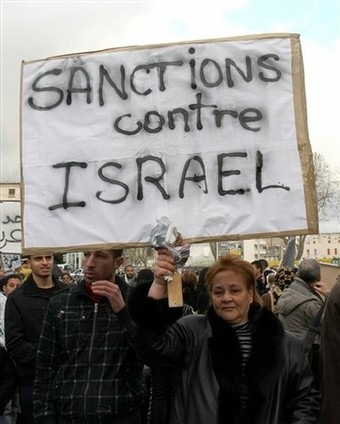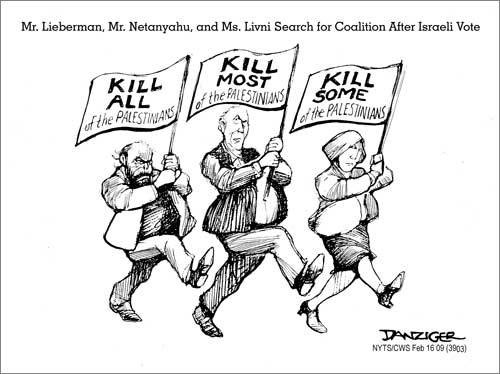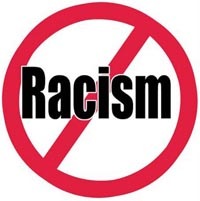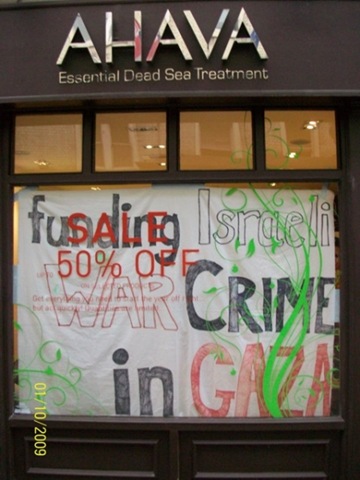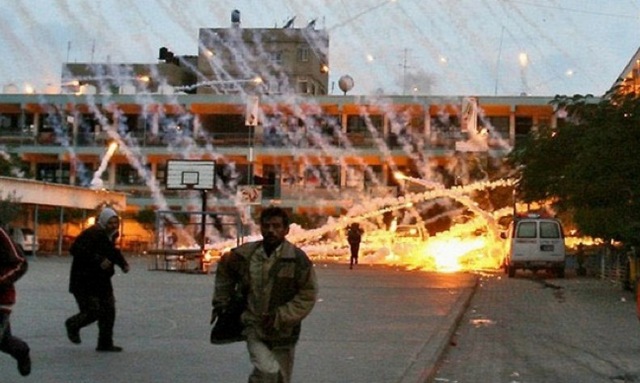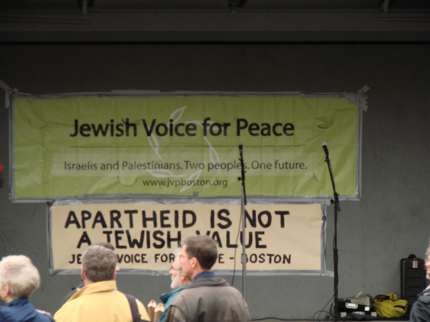The Likud has presided over all but three of the past 13 Israeli governments since 1977 and bears the greatest responsibility for government policies and for the way both intifadas have been handled. Thus, my harsh critique of Israel is in some ways synonymous with a critique of the Likud. As a Jew myself, I find no connection between Judaism’s ethics and current Israeli policies.
Far from creating a strategic center of stability in the Middle East, as neo-conservatives had once hoped, the U.S. occupation of Iraq is now a mirror of the 16-year-old Israeli quagmire in Gaza and the West Bank. Both situations in parallel threaten to destabilize any remaining good will the Arab world once had toward the United States, not only because of our own missteps but because of our uncritical support, and now overt emulation, of Israel. After 9/11 the gloves came off. Israel, known for its “extrajudicial killings” (i.e., illegal assassinations), torture and preemptive strikes against terrorists was seen as the model of how to handle homeland security and terrorism.
The Dec. 9, 2003, issue of Time magazine asked, “The U.S. military is reportedly turning to Israel for tips on how to manage the insurgency in Iraq. Will it work?” Iraqis, who as Time pointed out, grew up with images of Israelis dishing out rough treatment to Palestinian civilians, had an idea of what might be coming. Americans, had they and Congress not suspended critical judgment, should have expected a disaster, as well.
Israeli Defense Forces trainers were sent to Fort Bragg to train U.S. squads. Use of the IDF technique of bulldozing homes of suspected terrorists is now being used in the Sunni Triangle. Searches of homes are often accompanied by destruction of doors and walls, a technique used by the IDF in Gaza and the West Bank.
Also familiar in the West Bank, checkpoints and home invasions have become routine in Iraq. Israeli practices of kidnapping and incarcerating relatives of targets of military interest also have been introduced in Iraq. Many of the female detainees in Abu Ghraib are simply spouses or children of suspected Baathists.
According to a November 2002 article by John Diamond in USA Today, Israeli commandos were active in Iraq, looking for Scud missile sites before the invasion. The same article reported that Israel also built two mock Iraqi towns in Israel for American training exercises that were taught by IDF forces.
Using the Israeli policy of preemption used in Lebanon and Syria, U.S. troops are now behind the lines in Syria, hunting down suspected jihadis before they can cross the border into Iraq. However, this technique might have unintended consequences. This week, for example, U.S. troops accidentally wiped out a clan of 45 people at a wedding party in Iraq on the Syrian border.
Techniques employed at Abu Ghraib also appear to have been patterned after those used at one time by Shin Bet, the Israeli security service. In September 1999, the Israeli Supreme Court ruled that Shin Bet’s “coercive techniques” could be no stronger than those applied by the police. However, the list of techniques documented in the Taguba report reads like a list of those banned techniques: blasting prisoners with noise while bent, bound and beaten in urine-soaked hoods, violent shaking, sleep deprivation and forcing prisoners into painful positions for long periods of time.
The U.N. Committee Against Torture, Amnesty International and Human Rights Watch, among others, all have criticized Israel for routine torture. The second intifada, which began in September 2000, has killed 2,700 Palestinians, including 545 children, and there have been as many as 20,000 injuries. Israeli deaths have totaled approximately 840, including 100 children, with perhaps 2,500 injuries. The disproportionate number of deaths and injuries of Palestinians results from the continual use of lethal force against civilians. Of course, it is also true that Hamas targets civilians almost exclusively. However, both sides’ atrocities should be receiving equal condemnation from the U.S.
For example, on May 19, Israeli forces opened fire with tanks and helicopter gunships on a protest march of 3,000 people in Rafah in Gaza, killing 10 to 23 children. Israelis from peace organizations such as Shalom Achsav, Brit Tzedek v’Shalom, and other segments of society condemned the massacre, but here in the U.S., the Bush administration only called for more “restraint” by Israel. The U.N. Security Council passed a resolution, 14-0, condemning Israel.
The U.S. abstained. Why the tepid condemnation or none at all? Could it be because the U.S. is now using similar tactics in Afghanistan and Iraq?
It has been recently reported in the Arab press that American snipers have killed a high proportion of women in Falluja. One report counted 56 women killed by snipers as of April 17.
Also on May 19, the newspaper Ha’aretz reported that 2000 Israelis in a peace march were headed for the besieged city of Ramallah with 20 vehicles of donated food and supplies. Police broke up the march with tear gas and rifle butts. Several people were injured, including a member of the Knesset. Peaceful assembly and rights of expression are often a problem in Israel. Within Israel, there has been strong condemnation of the IDF’s treatment of Palestinians. In a November 2003 article by Esther Schrader and Josh Meyer in the Los Angeles Times, Chief of Staff Moshe Yaalon, a group of retired leaders of the Shin Bet internal security service and a number of active-duty soldiers are quoted as saying that Israeli measures have been unduly harsh and threaten to destroy Israeli and Palestinian society if no solution is found to the conflict.
Even Israel’s military establishment knows that these strategies have failed. On November 26, 2002, Maj. Gen. Yaakov Amidror addressed the Washington Institute’s Special Policy Forum. In this speech, he suggested that “if Saddam Hussein were deposed … the Palestinian leadership would see that reform is inevitable in the long run – that the only way to negotiate is without terror. Hence, action in Iraq could be an important factor in changing the mindset of the Palestinians and, perhaps, other Arab leaders.”
Of course, Amidror was wrong, but his better points, dwarfed by the remarks on Iraq, were that Israel’s current methods lack a coherent strategy. He warned policymakers that “at the end of the day,” Israel must negotiate with the Palestinians and that civilians must not be harmed.
Just as even formerly pro-war Americans have begun to call for an exit strategy in Iraq, many Israelis have been calling for an exit strategy in Gaza and the West Bank for years. Last weekend, 150,000 people demonstrated in Rabin Plaza in Tel Aviv, calling for Israel to get out of the territories. Even Ariel Sharon, who apparently is seen as a softy within his own Likud party, sees the hand writing on the wall: Israel cannot hang on to the West Bank and Gaza much longer. Whatever our cultural and religious backgrounds in this country, we should be standing up for justice, not defending policies that we would be embarrassed by or prevented by federal law from carrying out domestically. This applies to our actions in Iraq and our support for Israel. Why is the Bush administration trying to create legal gray zones where U.S. law does not apply?
In Israel’s case, certainly it is a nation of laws and a parliamentary democracy. But we don’t need to idealize a nation that builds a Berlin Wall on stolen land, bulldozes homes, runs checkpoints that remind one of apartheid, conducts dubious and violent interrogations and has not been able to draft a Constitution in the 50-plus years it has existed. In our own case, we should not be supporting leaders who have ripped up selected pages of our own constitution, such as habeas corpus.
We have to stop conducting and condoning Machiavellian foreign policy and just do the right thing. And the right thing is to condemn torture, cease practicing it ourselves, condemn attacks on civilians, cease practicing it ourselves, and deal fairly with all people in the Middle East, whether they have oil reserves or not. This is going to require Americans to replace the Bush administration, just as peace in Israel will require the Likud to be replaced.
Like us, like Iraq, like Israel, every nation is a country in evolution. No country finds its way by being forced to follow another’s example.
This is the lesson we need to learn from our disaster in Iraq. This is the lesson we should learn from many of Israel’s failures. And it is a lesson we should have learned more than 30 years ago in a place called Vietnam.
This was published in the Standard Times on May 21, 2004
http://archive.southcoasttoday.com/daily/05-04/05-21-04/a14op267.htm
(link may be broken)
